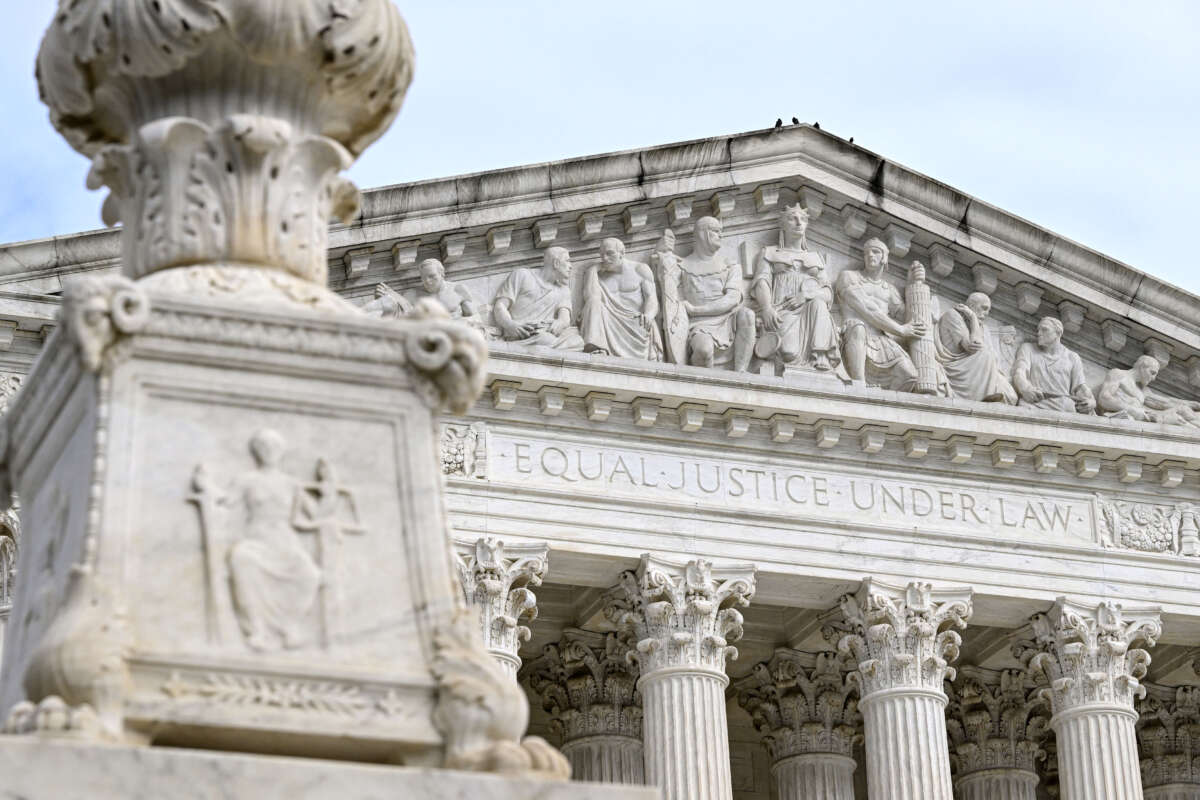Honest, paywall-free news is rare. Please support our boldly independent journalism with a donation of any size.
On Tuesday, the U.S. Supreme Court denied Alabama’s request to reinstate a Republican-drawn congressional map, in a victory for voting rights advocates and Black Alabama voters who had sued over the gerrymandered map.
In June, the Supreme Court had struck down Alabama’s previous map, asserting that it was the product of racist gerrymandering. The justices found that the map diluted the power of Black voters by unfairly packing Black voters into one majority-Black district near the capital city of Montgomery, despite the fact that Black Alabamans make up around 27 percent of the state’s population.
“This decision is a crucial win against the continued onslaught of attacks on voting rights,” Deuel Ross, the NAACP Legal Defense Fund director of litigation, said in a statement. “Alabama attempted to rewrite federal law…. But because of the state’s sordid and well-documented pattern of persisting racial discrimination, race must be considered to ensure communities of color are not boxed out of the electoral process.”
In July, the Republican-controlled Alabama state legislature attempted to defy the Supreme Court’s mandate to redraw its maps, which required lawmakers to create a map featuring two districts in which Black voters would be the majority “or something close to it.” But state legislators once again passed a congressional map that included only one majority-Black district.
“MAGA extremists are desperate to run on an illegal and racially gerrymandered House map. Why? That’s the only way they can win,” the campaign account for House Minority Leader Hakeem Jeffries (D-New York) said on social media.
The next month, federal judges reviewing Alabama Republican lawmakers’ redrawing of the congressional districts expressed deep skepticism that the new maps rectified the state’s attempt to diminish Black voting power. “What I hear you saying is the state of Alabama deliberately disregarded our instruction,” Judge Terry Moorer said at one point during a hearing on the matter.
Abha Khanna, an attorney representing Black voters in the state, said that Alabama lawmakers chose “defiance over compliance” and that the state chose to “thumb its nose at this court and to thumb its nose at the nation’s highest court and to thumb its nose at its own Black citizens.”
In September, federal appeals judges ruled that Alabama’s redrawn congressional map was in fact in violation of the Supreme Court’s mandate that called for the establishment of two majority-Black districts, and likely also violated the Voting Rights Act.
“We are deeply troubled that the State enacted a map that the State readily admits does not provide the remedy we said federal law requires,” the judicial order stated. “We are not aware of any other case in which a state legislature — faced with a federal court order declaring that its electoral plan unlawfully dilutes minority votes and requiring a plan that provides an additional opportunity district — responded with a plan that the state concedes does not provide that district.”
In response, Alabama state officials appealed that decision to the Supreme Court and asked the court for a stay of the decision pending appeal. The court declined to block Alabama’s request for an emergency stay on the ruling, and an official will now be appointed by the courts to draw the congressional district lines for the 2023 election, to ensure that districts are not gerrymandered to diminish the power of Black voters.
“Today is a major win for voting rights,” the ACLU of Alabama said on social media. “SCOTUS rejected AL’s attempt to deny Black voters a 2nd majority district. After many attempts by the state of AL to eliminate fair representation, a Special Master and cartographer have been directed to draw the map for the 2024 Election.”
Holding Trump accountable for his illegal war on Iran
The devastating American and Israeli attacks have killed hundreds of Iranians, and the death toll continues to rise.
As independent media, what we do next matters a lot. It’s up to us to report the truth, demand accountability, and reckon with the consequences of U.S. militarism at this cataclysmic historical moment.
Trump may be an authoritarian, but he is not entirely invulnerable, nor are the elected officials who have given him pass after pass. We cannot let him believe for a second longer that he can get away with something this wildly illegal or recklessly dangerous without accountability.
We ask for your support as we carry out our media resistance to unchecked militarism. Please make a tax-deductible one-time or monthly donation to Truthout.
